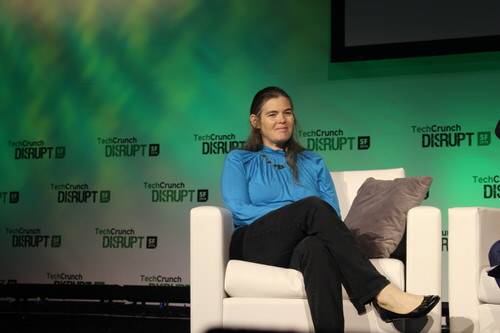
This is the year massive open online courses (MOOCs) come of age, says Daphne Koller, cofounder and president of Coursera. And the way her company’s helping that happen is offering up learning on-demand.
Consumers are accustomed to getting everything as soon as they request it, Koller explained Wednesday at TechCrunch Disrupt in San Francisco. So Coursera is testing a way for learners to start classes immediately, right when they sign up, rather than waiting, sometimes months, for the class to begin.
“We find the number of people who enroll for a class and immediately start taking it are twice as likely to complete it as those who enroll a month or two before it begins,” Koller explained.
See Also: I Failed My Online Course—But Learned A Lot About Internet Education
Coursera is currently testing this self-paced model in four classes, and Koller said that the course completion is promising. The company is planning on rolling it out to more courses overtime.
But Completion Rates Are Still Low
One of the repeated criticisms of MOOC providers like Coursera and Udacity is the abysmal completion rates. People sign up for courses, they just don’t finish them.
For Coursera, only 5% of people who click “enroll,” actually complete the class, Koller said. That number dramatically increases when students are offered the opportunity for completion certificates or credentials provided by online course providers.
One of the most popular credentialed classes, the Johns Hopkins Data Science specialization, not only gives students the benefit of learning the concepts of one of the most high-demand technological fields, but also provides them with the necessary skills and credentials to showcase for employers.
The data science specialization is one of a handful of paid course programs that Coursera launched in January to help increase completion rates among students.
“The credentials are becoming much more valued in the workplace—70% of our learners want to post their credential on their resume,” Koller said. “Conversion rates among learners who are taking a course for the credential have more than doubled.”
According to a study by Duke University, employers are taking online course credentials seriously, too. Of the 398 employers that participated in the survey, 72% of those that were familiar with MOOCs “had used, considered using, or could see their company using MOOCs for recruitment.”
When paired with on-demand and self-paced learning, these accredited courses could provide a way for students to fast-track their careers inexpensively. For example, in the time it would take an unemployed student to sign up for a traditional MOOC course and wait for it to begin, he or should could’ve already completed a similar class via Coursera fast track option.
Coursera, and others like it, are changing the way people can access and take classes—you don’t have to be in college to take a college course anymore. And the last two years have only scratched the surface.
“We have demonstrated our learners are seeing a big impact on their lives,” Koller said.
Image by Selena Larson for ReadWrite.










